6/30/2025
The Benefits of Infertile Pennisetum
Kerstin Poehlmann
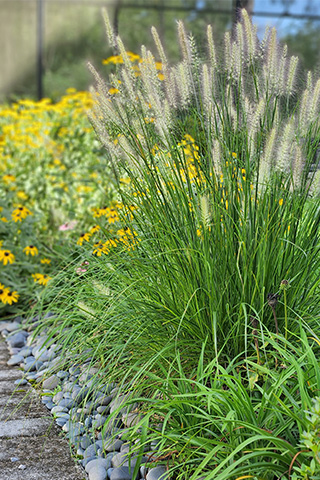
Ornamental grasses continue to gain popularity in North American gardens and landscapes, and that’s no surprise when considering their many benefits. Whether they’re selected for their beauty and grace or because they can fill needs for drought tolerance, tough soil conditions or native habitats, there’s an ornamental grass for nearly every need. And while their beautiful flowers can be the icing on the cake atop striking foliage, there are situations where viable seed isn’t desirable, in which case infertile grasses become the perfect option.
For the grower, this helps keep the variety true to type in container production. It’s also an advantage for the consumer to help keep the variety in check in their garden and confident that the plant will remain true to name.
The other, perhaps less-obvious advantage of infertile grasses, is that, because the plants aren’t putting energy into producing seeds, they’re more vigorous, flower earlier and produce flowers for a longer period of time.
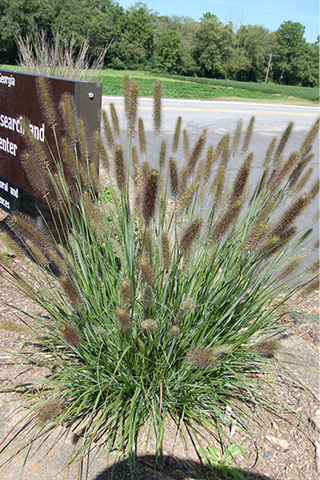 Emerald Coast Growers—one of North America’s premier suppliers of ornamental grass liners and plugs—recognized the need for infertile grasses decades ago, and works diligently with breeders and university researchers to continuously bring more infertile grasses to the market that are as beautiful as they are valuable. While their collection of infertile grasses includes over a dozen pennisetum and miscanthus, today’s spotlight is on their lineup of infertile Pennisetum alopecuroides, commonly known as fountain grass.
Emerald Coast Growers—one of North America’s premier suppliers of ornamental grass liners and plugs—recognized the need for infertile grasses decades ago, and works diligently with breeders and university researchers to continuously bring more infertile grasses to the market that are as beautiful as they are valuable. While their collection of infertile grasses includes over a dozen pennisetum and miscanthus, today’s spotlight is on their lineup of infertile Pennisetum alopecuroides, commonly known as fountain grass.
Emerald Coast Growers has been working with the University of Georgia’s Dr. Wayne Hanna for years to bring infertile pennisetum to market. Currently, this includes the following five selections:
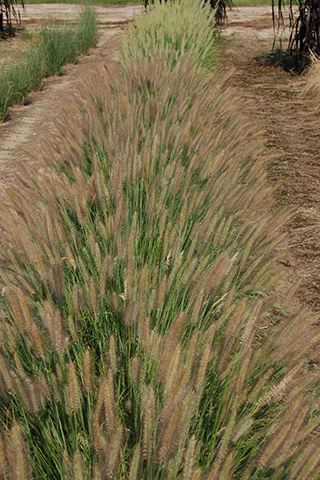 Pennisetum alopecuroides Cayenne (PP31097) features big, dark-red bottlebrush plumes that rise above mounds of rich green arching blades with a very long bloom time. Cayenne prefers full sun to partial shade, reaches 36-in. in the garden and is hardy in USDA Zones 5 to 9.
Pennisetum alopecuroides Cayenne (PP31097) features big, dark-red bottlebrush plumes that rise above mounds of rich green arching blades with a very long bloom time. Cayenne prefers full sun to partial shade, reaches 36-in. in the garden and is hardy in USDA Zones 5 to 9.
Pennisetum alopecuroides Hush Puppy (PP31027) has long-lasting pink plumes that spray high over rounded mounds of slender foliage. Hush Puppy prefers sun to partial shade, reaches 30-in. tall and is hardy in USDA Zones 5 to 9.
Pennisetum alopecuroides Etouffee (PP31062) features light pinkish brown foxtail plumes rising over graceful arching mounds. It flowers spring to fall and forms a lovely mound that’s excellent in containers and landscapes alike. Etouffee loves sun to partial shade, grows to 42 in. and is hardy in USDA Zones 5 to 9.
Pennisetum alopecuroides Jambalaya (PP31176) grows in a lovely, tidy mounded habit to about 38-in. tall. It produces large, long-lasting silvery-pink plumes that rise above slender, upright foliage from late spring to mid-fall. It prefers sun to partial shade and is hardy in USDA Zones 5 to 9.
Pennisetum alopecuroides Praline (PP30724) features lovely soft taupe, gently upright seed heads above mounds of slender, arching green leaves. A sun-lover, Praline is hardy in USDA Zones 5 to 9 and reaches 18 in. in the garden, making it the most petite variety in the collection.
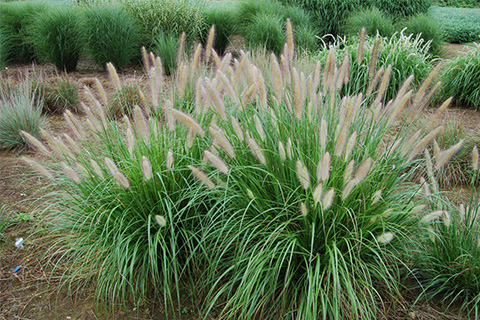 All of these infertile pennisetum perform best in full sun to partial shade and are available in 38-cell liners. Growing requirements are the same as for fertile pennisetum selections.
All of these infertile pennisetum perform best in full sun to partial shade and are available in 38-cell liners. Growing requirements are the same as for fertile pennisetum selections.
So what prompted Emerald Coast Growers to introduce infertile grasses in the first place? Shannon Ballard, New Plants Manager for Emerald Coast, said: “We wanted to remove the concern about seed fertility in grasses. We are fortunate to work with breeders who are developing infertile miscanthus and pennisetum for their ornamental value, economic savings in production and performance in the garden. The ultimate reason we are offering these grasses is to be responsible in the industry. This ensures that the grower and consumer will be able to have confidence in these two genera whether they have concerns or not.”
Shannon has observed a slow and steady increase in demand for infertile grasses.
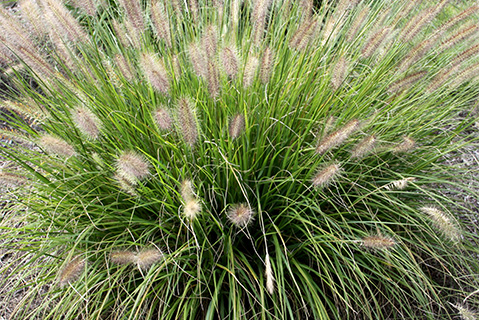 “Their popularity has mostly gained momentum with growers to have an alternative for those with concerns,” she explained. “The pennisetums’ sales velocity is increasing a little faster with container growers wanting better crop consistency. They also have great ornamental characteristics, rivaling other grasses in the industry.”
“Their popularity has mostly gained momentum with growers to have an alternative for those with concerns,” she explained. “The pennisetums’ sales velocity is increasing a little faster with container growers wanting better crop consistency. They also have great ornamental characteristics, rivaling other grasses in the industry.”
Asked what’s coming down the pipeline at Emerald Coast Growers, Shannon stated: “We are always looking to provide the most current breeding and addressing any issues that arise for the grower and the consumer.”
For more information about infertile grasses or to order, visit ecgrowers.com or call (877) 804-7277. GT
Kerstin Poehlmann is president of Pen & Petal, Inc., a marketing communications firm for the green industry. She can be reached at kerstin@penandpetal.com.